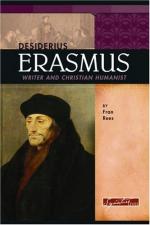|
This section contains 7,730 words (approx. 26 pages at 300 words per page) |

|
SOURCE: O'Malley, John W. “Grammar and Rhetoric in the Pietas of Erasmus.” Journal of Medieval and Renaissance Studies 18, no. 1 (spring 1988): 81-98.
In the following essay, O'Malley suggests that it was as a grammarian that Erasmus chiefly defined his humanism, meaning that Erasmus tended to place greater value on texts and teaching rather than on oratory and public life. O'Malley considers how this stance influenced Erasmian theology, including his more mystical, contemplative brand of Christianity and his emphasis on Christ as a teacher of philosophy.
When Erasmus in both 1523 and 1530 categorized into various ordines his writings up to those dates, he designated the “fifth order” as works “pertaining to piety”—pertinentium ad pietatem.1 The number of such works was large, and it was made even larger by subsequent editors who had to account for Erasmus' publications from 1530 until his death in 1536. The fifth volume of the Leiden edition, which...
|
This section contains 7,730 words (approx. 26 pages at 300 words per page) |

|


